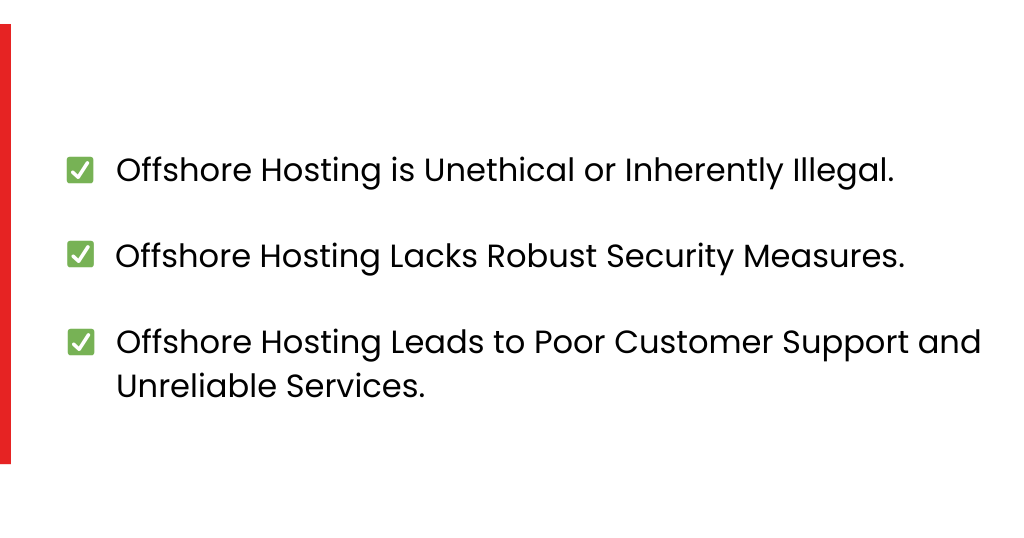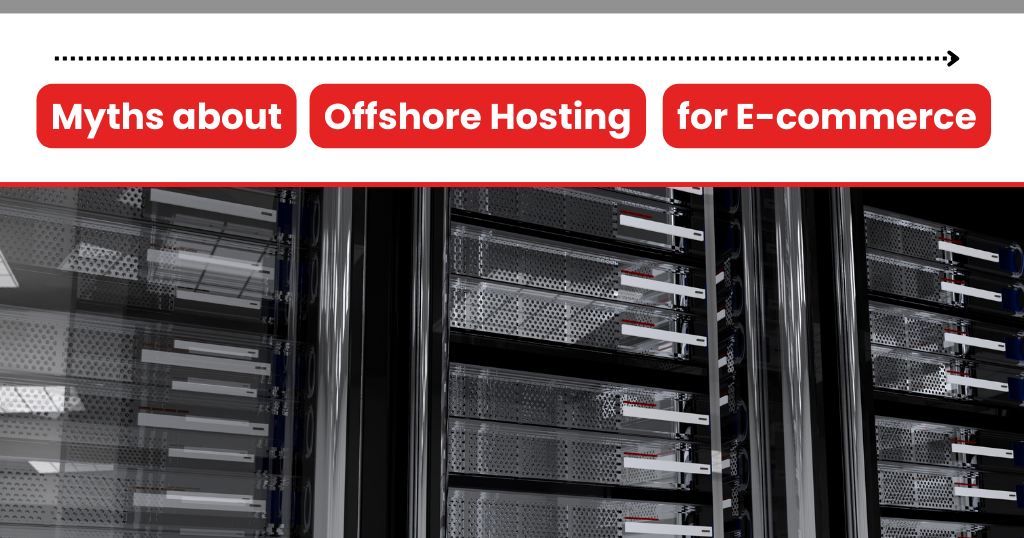The industry landscape has been drastically changed by offshore hosting for e-commerce, which brings with it a dynamic combination of benefits and disadvantages. E-commerce websites are now more globally accessible, providing better user experiences and maybe higher conversion rates.
Positively, offshore hosting for e-commerce has given companies more control over data security and privacy, which has helped them deal with a variety of regulatory environments and maybe lessen the burden of compliance. Businesses who are concerned about expenses have begun to look into hosting choices overseas due to the allure of cheaper operating costs in offshore jurisdictions.
However, there have been some negative effects to this change as well. These include issues with latency and consumer trust, worries about different security requirements, and even legal repercussions from non-compliance. The way that offshore hosting affects e-commerce highlights the intricate ways in which legislative frameworks, economic factors, and the necessity of striking a balance between cost-cutting and upholding a reliable and significant online presence interact.
Offshore hosting can be a viable and ethical choice for businesses, provided they conduct thorough research, select reliable providers, and adhere to relevant legal frameworks. The nuanced understanding of offshore hosting helps dispel misconceptions and allows businesses to leverage its benefits while mitigating potential challenges.
Offshore Hosting for e-commerce and Myths associated to it!
“Myths are early science, the result of men’s first trying to explain what they saw around them”!
The spread of fallacies regarding offshore e-commerce hosting can be ascribed to a combination of misinformation, varied perspectives, and the complex nature of hosting services in various jurisdictions. For example, a misconception is that offshore hosting is inherently associated with illicit or unethical activity. While it’s true that some companies might take advantage of the regulatory latitude and privacy provided by some offshore jurisdictions, a large number of companies choose offshore hosting in order to profit legally from advantageous economic circumstances, lower operating expenses, and less onerous regulatory frameworks.

Different myths about offshore hosting for e-commerce have proliferated because of the belief that using offshore hosting will always make it harder to comply with the law. Actually, a lot of offshore jurisdictions have set up legal frameworks with explicit compliance criteria in order to draw in foreign enterprises. But miscommunications occur when companies don’t fully investigate and comprehend the offshore location’s legal environment.
What is the need to dispel the myths about offshore hosting for e-commerce?
In order to enable customers to make educated decisions based on accurate information, it is imperative to dispel myths around offshore hosting for e-commerce. Irrational concerns and bad decisions might arise from misconceptions regarding security, performance, legal compliance, privacy of data, and security.

Customers will be better equipped to understand the risks and benefits of offshore hosting by debunking these myths, which will also help them access providers with objectivity. This clarity is essential for navigating the intricate global hosting ecosystem and ensuring that consumers can take full use of offshore hosting's advantages while efficiently resolving any problems. The last point is that dispelling myths promotes a more knowledgeable and assured approach to choosing hosting solutions tailored to the unique requirements of e-commerce businesses.
Common Myths about Offshore Hosting for E-Commerce:
In this piece of information we will discuss a few common myths associated to offshore hosting for e-commerce and debunk these one by one:

Myth 1: Offshore Hosting is Unethical or Inherently Illegal:
The myth that offshore hosting for e-commerce is intrinsically linked to illicit or unethical activity is a prevalent misconception about it. As it happens, businesses employ offshore hosting for a variety of lawful purposes.
In order to take advantage of financial benefits including lower operating expenses and tax advantages provided by specific jurisdictions, many businesses opt for offshore hosting. It is important to realize that choosing offshore hosting is driven by a variety of considerations, such as regulatory compliance, market accessibility, and privacy issues.
- Debunking it with due Diligence and Compliance:
To remove the myth that offshore hosting is inherently unlawful or unethical, it is critical to underline the significance of due diligence and compliance. Businesses must conduct extensive research and select reliable hosting providers who operate within the legal constraints of their selected offshore jurisdiction. Adherence to local and international rules guarantees that hosting methods are in accordance with ethical standards and legal obligations. Businesses can engage in offshore hosting without jeopardizing ethical considerations by selecting reputable suppliers and according to the law.
Myth 2: Offshore Hosting Lacks Robust Security Measures
A prevalent myth surrounding offshore hosting suggests that it inherently lacks robust security measures, leading to concerns about the safety of hosted data. Contrary to this misconception, the security of hosting services is primarily determined by the practices and commitments of the hosting provider rather than the geographical location. Reputable offshore hosting companies prioritize security and invest heavily in advanced technologies and protocols to safeguard client data. This includes encryption, regular security audits, and the implementation of industry-standard security measures.
- Debunking it with Certifications and Industry Standards:
To debunk the myth, it’s essential to highlight that many offshore hosting providers adhere to industry standards and obtain relevant certifications to demonstrate their commitment to security. By choosing a reliable and security-conscious offshore hosting provider, businesses can ensure that their data is protected at levels equivalent to or even surpassing those in more regulated jurisdictions.
Businesses considering offshore hosting should look for providers with recognized certifications, reinforcing the idea that offshore hosting can indeed offer robust security measures. Certifications such as ISO 27001 for information security management systems are commonly pursued by reputable hosting companies. These certifications validate that the hosting provider follows rigorous security practices and complies with international standards.
Myth 3: Offshore Hosting Leads to Poor Customer Support and Unreliable Services
One more common misconception surrounding offshore hosting is the belief that it inevitably results in subpar customer support and unreliable services. In reality, the quality of services offered by offshore hosting providers varies widely. Reputable offshore hosting companies prioritize customer satisfaction and invest in robust support infrastructure. It’s important for businesses to recognize that the reliability of services and the responsiveness of customer support depend more on the specific provider’s commitment to excellence rather than the offshore location.
- Debunking it with Research and Reputation:
To dispel this myth, it’s crucial to emphasize the importance of thorough research and the consideration of provider reputation. While some less reputable providers may exist, many offshore hosting companies maintain high standards of service quality. Businesses can debunk this myth by selecting providers with positive customer reviews, a history of reliability, and a commitment to addressing customer concerns promptly. By carefully evaluating the reputation and track record of offshore hosting providers, businesses can ensure they receive reliable services and responsive customer support, regardless of the hosting location.
Myth 4: Offshore Hosting Complicates Legal Compliance
A widespread misconception suggests that offshore hosting inherently complicates legal compliance. In reality, the legal landscape varies among jurisdictions, and offshore hosting doesn’t automatically lead to compliance challenges. Debunking this myth involves understanding the legal frameworks of the chosen offshore location. Many offshore jurisdictions have clear and well-established regulations for international businesses, and adherence to these laws is entirely feasible with proper research and understanding.
- Debunking it with due Diligence and Adherence to Regulations:
The key to debunking the myth is recognizing the diversity within the offshore hosting provider landscape and conducting diligent research to choose a reputable and reliable service. To dispel concerns about legal compliance, e-commerce businesses engaging in offshore hosting are in need to prioritize due diligence. This includes researching and comprehending the regulatory requirements of the chosen jurisdiction, ensuring that the hosting practices align with local and international laws. Debunking this myth underscores the importance of businesses taking proactive steps to adhere to regulations, reinforcing that offshore hosting, when done responsibly, doesn’t inherently complicate legal compliance.
Conclusion:
Offshore hosting for e-commerce has brought about a significant transformation in the industry, presenting both opportunities and challenges. The prevalence of fallacies regarding offshore hosting for e-commerce can be ascribed to a lack of nuanced understanding, generalizations, and the occasional misuse of hosting services. It is critical for organizations and individuals to undertake extensive research, distinguish between reality and fiction, and select reputable hosting providers who correspond with their needs.
The proliferation of myths surrounding offshore hosting is largely fueled by misinformation and generalizations. By addressing these myths individually, it becomes evident that offshore hosting is not inherently illegal or unethical. Instead, businesses often choose it for legitimate reasons, such as economic advantages and favorable regulatory environments. Additionally, debunking the myths about the lack of security measures, poor customer support, and complications in legal compliance underscores the importance of due diligence, reputable providers, and understanding the diverse landscape of offshore hosting.



